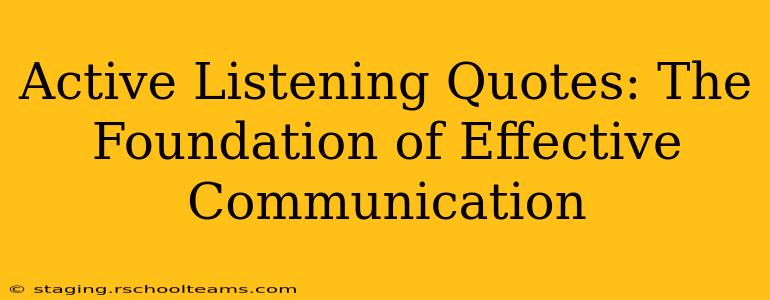Active listening. It's a phrase thrown around in business seminars, therapy sessions, and even casual conversations. But what does it really mean, and why is it so crucial for effective communication? This article delves into the power of active listening, exploring its core tenets and showcasing impactful quotes that highlight its significance. We'll also tackle some frequently asked questions to solidify your understanding of this vital communication skill.
What is Active Listening?
Active listening goes beyond simply hearing words; it's about truly understanding the speaker's message, both verbally and nonverbally. It involves paying close attention to what's being said, observing body language, asking clarifying questions, and providing feedback to ensure comprehension. It's a conscious effort to connect with the speaker on a deeper level, fostering empathy and building stronger relationships. Think of it as a two-way street, where the listener is just as involved as the speaker in creating a meaningful exchange.
The Power of Active Listening Quotes: Inspiration and Insight
Numerous insightful quotes encapsulate the essence of active listening and its profound impact on communication. Here are a few that resonate deeply:
-
"The most basic of all human needs is the need to understand and be understood." - Ralph Nichols This quote highlights the fundamental human desire for connection, a desire that active listening directly addresses. When we actively listen, we demonstrate our understanding and create a space for the speaker to feel heard and valued.
-
"Most people do not listen with the intent to understand; they listen with the intent to reply." - Stephen Covey This powerful statement points to a common pitfall – the tendency to formulate our response while the other person is still speaking. Active listening demands we set aside our own thoughts temporarily and focus solely on the speaker's message.
-
"Listening is a magnetic and creative force." - Frank Tyger This quote beautifully captures the transformative power of active listening. When we genuinely listen, we create a space for connection, collaboration, and even innovation. It draws people in and encourages open communication.
Why is Active Listening Important?
Active listening isn't just a nice-to-have skill; it's a cornerstone of successful communication across all aspects of life – personal, professional, and social. It builds trust, strengthens relationships, improves problem-solving, and prevents misunderstandings. In the workplace, active listening leads to increased productivity, better teamwork, and improved employee morale. In personal relationships, it fosters deeper connections and stronger bonds.
Frequently Asked Questions (FAQs)
Here are some common questions about active listening, answered comprehensively:
What are some techniques for active listening?
Active listening involves a multitude of techniques, including:
- Paying attention: Minimize distractions and focus on the speaker.
- Showing that you're listening: Use nonverbal cues like nodding, maintaining eye contact, and leaning in.
- Providing feedback: Summarize or paraphrase what the speaker said to confirm understanding.
- Asking clarifying questions: Seek clarification if something is unclear.
- Reflecting feelings: Acknowledge the speaker's emotions.
- Withholding judgment: Listen objectively without interrupting or forming immediate opinions.
How can I improve my active listening skills?
Improving active listening skills takes practice and conscious effort. Here are some tips:
- Practice mindfulness: Be present in the moment and focus on the speaker.
- Focus on understanding, not responding: Resist the urge to interrupt or formulate your response prematurely.
- Seek feedback: Ask others for feedback on your listening skills.
- Take a listening course: Formal training can significantly enhance your skills.
- Reflect on your listening habits: Identify areas where you can improve.
What are the benefits of active listening in the workplace?
In the workplace, active listening contributes to:
- Improved communication: Reduces misunderstandings and enhances collaboration.
- Increased productivity: Leads to more efficient problem-solving and decision-making.
- Stronger teamwork: Builds trust and fosters positive relationships among colleagues.
- Improved employee morale: Employees feel valued and heard, leading to increased job satisfaction.
- Better conflict resolution: Facilitates constructive dialogue and finding mutually acceptable solutions.
How does active listening differ from passive listening?
Passive listening involves simply hearing the words without engaging with the speaker's message. Active listening, on the other hand, is an engaged and participatory process focused on understanding both the verbal and nonverbal cues of the speaker.
Active listening is not merely a skill; it’s a powerful tool for building stronger relationships, resolving conflicts, and fostering effective communication. By embracing its principles and utilizing the techniques outlined above, you can unlock its transformative power and experience its profound impact on your life.
